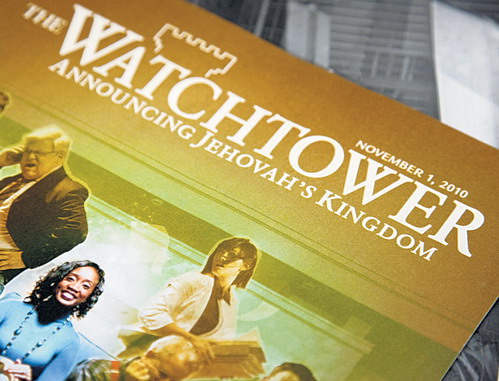
Your Witness Neighbor's Ultimate Authority
During the pandemic, I noticed that local Jehovah's Witnesses had begun sending outreach letters to local residents in lieu of door-to-door or public book stalls. Post-pandemic, this practice has continued. My household has received a number of these letters over the past three years. Maybe you have as well.
A recent letter from a Witness neighbor gave me the chance to put down and send some thoughts I've shared recently with a number of their adherents in face-to-face conversations around my community. I'm reprinting it here in the hope it will equip you. The letter isn't a comprehensive, gospel-saturated outreach tool. It is however a good starting point for further conversations, should God see fit to open that door. If you've received similar letters, feel free to adapt and use this response and see where the conversation goes. And thank you for praying as this letter goes out to my neighbor. May God use each of us as servants of his word!
[P.S. The “Governing Body” is the ruling council of the Jehovah's Witnesses organization.]
Gloria,
Thank you so much for your note and The Watchtower issue you enclosed. I absolutely agree with the opening sentence in your letter, "The Bible can be a great source of comfort." Amen! So many need to know that, don't they?
Sharing the Bible's spiritual truths with others is something I also recognize as important. As a fellow student of God's word, it's why I wanted to reply to your note. I have no doubt that if I asked you in person, "Is the Bible our ultimate authority when it comes to the truth about God, and how we can be in a right relationship with him?", you would say, "Yes!" But I am deeply concerned that for those who belong to your movement, in practice, that simply isn't true. Let me explain.
You believe the Governing Body is "God's channel of truth"1 today, that "Jehovah's organization alone, in all the earth, is direced by God's holy spirit"2. I understand that this "slave" claims it "is neither inspired nor infallible", and therefore, "it can err in doctrinal matters".3 But the far more common exhortation is for you to have "complete confidence in the truth as it is revealed by Jehovah God through his Son, Jesus Christ, and 'the faithful and discreet slave'."4 Similarly, "Christians have implicit trust in their heavenly Father; they do not question what he tells them through his written Word and organization."5 Along those same lines, we read as "Jehovah's dedicated Witnesses, all of us must be loyal to him and to his organization."6 The organization teaches, "only as the Lord God directs the "servant" to speak he does speak".7 Since that's held as true, you "need to take this guidance and direction seriously, for our everlasting life depends on our obedience."8 In summary, you are called to "respond to the directions of the "slave" as [you] would to the voice of God, because it is His provision."9
So in practice, Witnesses look to the Governing Body as their ultimate authority when interpreting Scripture. But the reverse should be true. Why were the Jews in Berea in Acts 17 described as "more noble"? Because "they received the word with all eagerness, examining the Scriptures daily to see if these things were so." (Acts 17:11) They were testing the Apostle Paul's words against the Hebrew Scriptures! Far too often in my experience with Witnesses, the plain sense of many passages is rejected because the interpretation does not line up with the organization's teaching. But how might admittedly fallible men, who "can err in doctrinal matters", be checked if they are revered as "God's channel of truth", and followers are instructed to "not question what he tells them through his written Word and organization"?
This dynamic is deeply concerning, and I hope you will reconsider what it means for the Bible to be our ultimate authority. And I'd be happy to share with you some of the many examples I mentioned earlier, examples where the plain sense of many passages is rejected by Witnesses because the interpretation does not line up with the Governing Body's teaching.
Faithful Christian leaders submit to God's word, never elevating themselves to its level, nor claiming to have special or exclusive powers to explain it. Instead, like Paul they confess, "We refuse to practice cunning or to tamper with God’s word, but by the open statement of the truth we would commend ourselves to everyone’s conscience in the sight of God." (2 Corinthians 4:2)
Thanks again for writing, and grace to you,
Bryce
1. Watchtower, Nov. 15, 1992, pp. 19-20
2. Watchtower, July 1, 1973, p.402
3. Watchtower, Feb. 2017, p.26
4. Watchtower, Aug. 1, 2001, p.14
5. Watchtower, July 15, 1974, p.441
6. Watchtower, Nov. 15, 1992, pp. 19-20
7. Vindication, Book One, 1931, pp.45-46
8. Watchtower, Aug. 15, 2014, p.21
9. Watchtower, June 15, 1957, p.370
Write a Comment